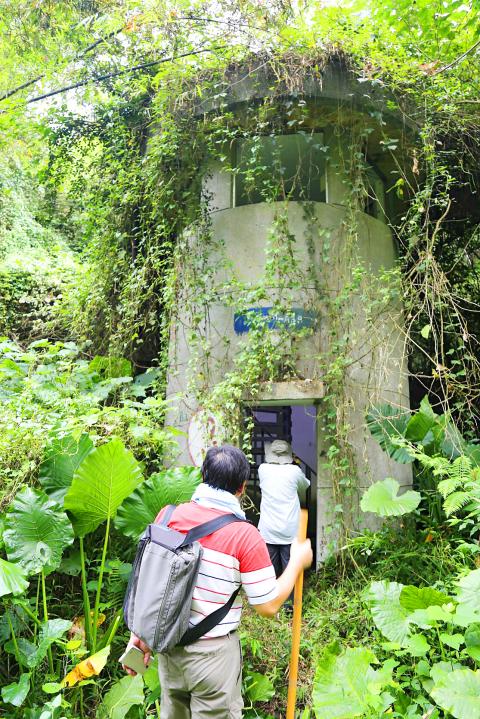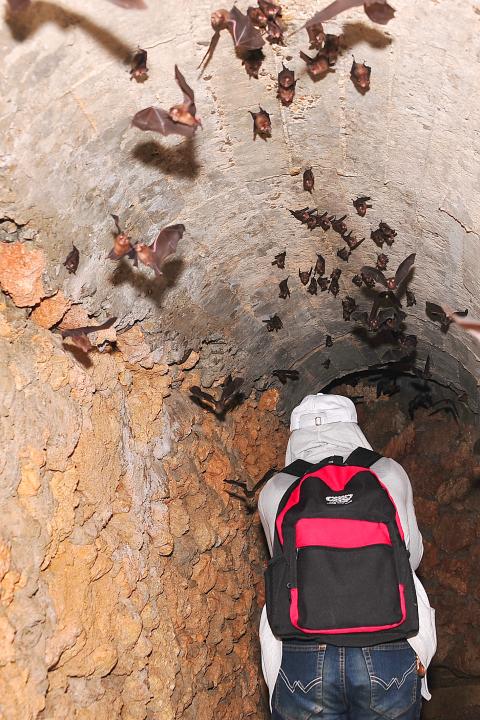The Pingtung County Government last week asked culture and history experts to inspect a former munitions depot in Neipu Township’s (內埔) Laopi Village (老埤), after it was recently discovered.
The munitions storage once served to supply ammunition to the kamikaze pilots of the Special Attack Units of the Imperial Japanese Army, the experts said, adding that it was not only well-preserved, but also of considerable size.
Near the end of World War II in the Pacific theater, the Japanese Empire built up a string of defensive positions stretching from the north to the south of Pingtung to prevent a potential landing by US troops in the south of the island, experts said.

Photo: Chiu Chih-jou, Taipei Times
There were about 20 ammunition depots along the defense line, they said, adding that many of the bunkers had not been found yet.
The experts said they would continue investigating the forgotten bunker cluster of Pingtung with funding provided by the Bureau of Cultural Heritage.
National Pingtung University of Technology and Science secretary-general Yeh Kui-chun (葉桂君) said the university had been given the plot of land by the National Property Administration in 2011 and it had discovered the bunker while inspecting the land with the aim of building an entrepreneurship campus.

Photo: Tsai Tsung-hsien, Taipei Times
The campus will help locals and students study and establish their own businesses, Yeh said, adding that the university had complied with all of the bureau’s demands to make arrangements for the bunker.
The county government said it is also mulling nominating the Guanshan area in Hengchun Township (恆春) as a cultural asset due to a fortified artillery bunker in the area.
Not as well-known as the Guanshan Scenic Area and the local Earth God Temple, the artillery bunker is located underground next to the Guanshan Scenic Trail.
While visiting the site on Thursday, Pingtung County Bureau of Cultural Affairs Director Wu Chin-fa (吳錦發) said he was amazed at the extensive network of underground tunnels, which the county has said is the largest artillery complex on the island from the Japanese colonial era.
The Republic of China Army took over the complex after World War II and it was eventually abandoned after the army relocated its troops, the county government said.
The structural integrity of the tunnel is still intact and the site was largely devoid of trash due to its relatively hidden location, the county said, adding that some bats had moved in.
Experts surmised that the artillery complex had been constructed after the Japanese forces retreated from Batan Island in the Philippines.
The county government has also visited other abandoned military facilities behind Pingan Temple in Fangshan Township (枋山).
A cultural asset meeting is to be held to discuss the preservation of the “precious relics,” it said.
The county government said it would work with local townships to hopefully repurpose the sites and turn them into tourist attractions.

Taiwan is stepping up plans to create self-sufficient supply chains for combat drones and increase foreign orders from the US to counter China’s numerical superiority, a defense official said on Saturday. Commenting on condition of anonymity, the official said the nation’s armed forces are in agreement with US Admiral Samuel Paparo’s assessment that Taiwan’s military must be prepared to turn the nation’s waters into a “hellscape” for the Chinese People’s Liberation Army (PLA). Paparo, the commander of the US Indo-Pacific Command, reiterated the concept during a Congressional hearing in Washington on Wednesday. He first coined the term in a security conference last

A magnitude 4.3 earthquake struck eastern Taiwan's Hualien County at 8:31am today, according to the Central Weather Administration (CWA). The epicenter of the temblor was located in Hualien County, about 70.3 kilometers south southwest of Hualien County Hall, at a depth of 23.2km, according to the administration. There were no immediate reports of damage resulting from the quake. The earthquake's intensity, which gauges the actual effect of a temblor, was highest in Taitung County, where it measured 3 on Taiwan's 7-tier intensity scale. The quake also measured an intensity of 2 in Hualien and Nantou counties, the CWA said.

The Overseas Community Affairs Council (OCAC) yesterday announced a fundraising campaign to support survivors of the magnitude 7.7 earthquake that struck Myanmar on March 28, with two prayer events scheduled in Taipei and Taichung later this week. “While initial rescue operations have concluded [in Myanmar], many survivors are now facing increasingly difficult living conditions,” OCAC Minister Hsu Chia-ching (徐佳青) told a news conference in Taipei. The fundraising campaign, which runs through May 31, is focused on supporting the reconstruction of damaged overseas compatriot schools, assisting students from Myanmar in Taiwan, and providing essential items, such as drinking water, food and medical supplies,

New Party Deputy Secretary-General You Chih-pin (游智彬) this morning went to the National Immigration Agency (NIA) to “turn himself in” after being notified that he had failed to provide proof of having renounced his Chinese household registration. He was one of more than 10,000 naturalized Taiwanese citizens from China who were informed by the NIA that their Taiwanese citizenship might be revoked if they fail to provide the proof in three months, people familiar with the matter said. You said he has proof that he had renounced his Chinese household registration and demanded the NIA provide proof that he still had Chinese